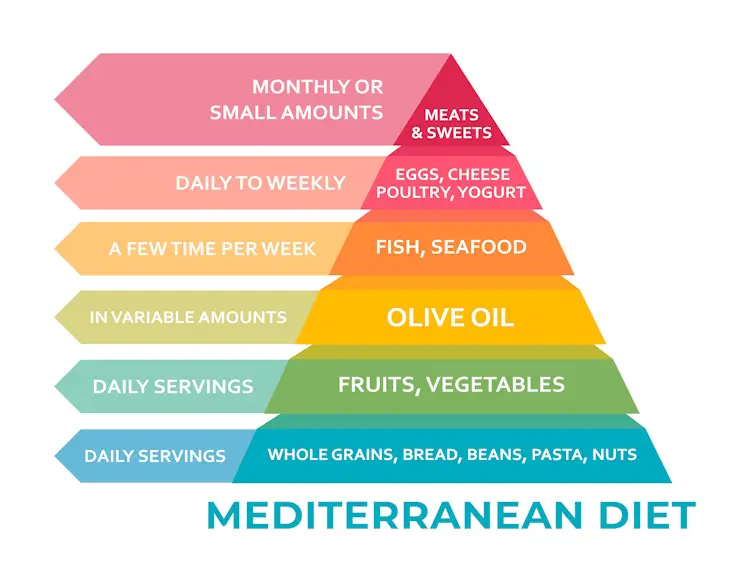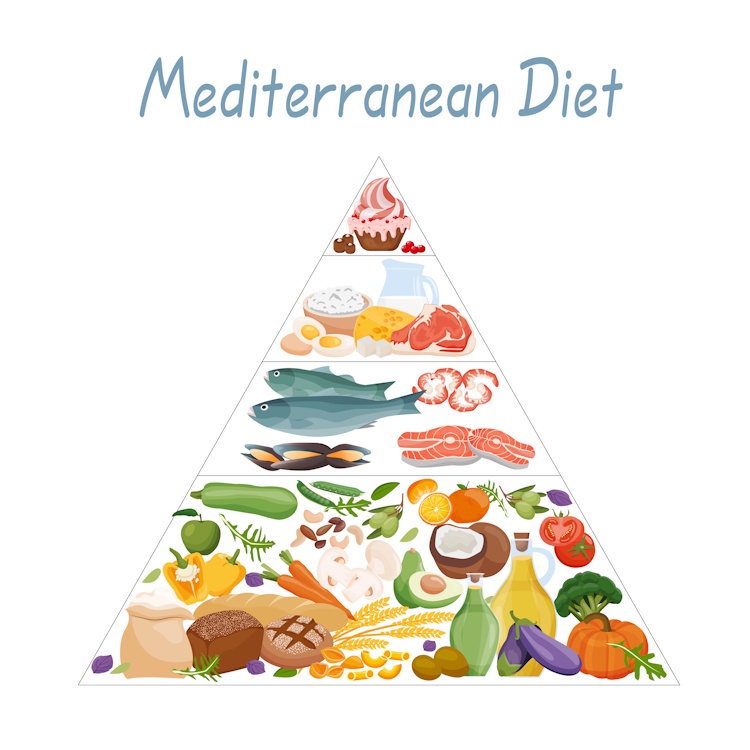Bone health becomes more important as we age. The Mediterranean diet and high-dairy diets are both linked to stronger bones. Each offers unique nutrients that can support bone strength and reduce fracture risks.
Thank you for reading this post, don't forget to subscribe!Which one works best for you? Keep reading to find out!
Key Takeaways
- The Mediterranean diet lowers hip fracture risk by 21% and improves bone mineral density (BMD) through anti-inflammatory foods like olive oil, fruits, and nuts.
- High-dairy diets provide 52–65% of daily calcium needs and improve BMD with protein from milk, yogurt, and cheese.
- A study showed extra virgin olive oil (EVOO) in the Mediterranean diet reduced osteoporosis-related fractures by 51%.
- Postmenopausal women benefit from up to three servings of dairy for stronger bones compared to supplements alone.
- Combining both diets can maximize bone health through anti-inflammatory nutrients and high calcium intake.
Key Nutritional Components of Each Diet
Each diet offers unique nutrients that impact bone health differently. Understanding these can help you decide which suits your goals and lifestyle better.
Nutrients in the Mediterranean Diet
The Mediterranean diet focuses on nutrient-rich foods. It includes extra virgin olive oil (EVOO), fruits, vegetables, whole grains, nuts, seeds, fish, and poultry. These provide vitamins C and D, antioxidants, omega-3 fatty acids, and essential minerals like calcium and magnesium.
Low amounts of red meat and sweets help reduce unhealthy fats.
Legumes supply protein while unrefined cereals add fiber—for better digestion and bone metabolism. EVOO supports anti-inflammatory processes critical for maintaining strong bones.
Moderate dairy intake adds to calcium levels without overloading fat consumption.
Nutrients in the High-Dairy Diet
Dairy foods pack a big punch of calcium, protein, magnesium, potassium, zinc, and phosphorus. These nutrients help build and maintain strong bones. Low-fat dairy products like milk and yogurt provide these benefits without added fats.
Calcium supports bone structure. Protein strengthens bone tissue. One cup of milk provides about 30% of daily recommended calcium for adults. Fermented dairy products like cheese also offer helpful minerals for bone health.
A diet high in dairy boosts calcium intake—key to healthier bones.
Bone Health Benefits of the Mediterranean Diet
The Mediterranean Diet supports strong bones through nutrient-rich foods like fruits, vegetables, and olive oil. Its anti-inflammatory effects may also help prevent bone loss over time.
Impact on Bone Mineral Density
Higher adherence to the Mediterranean diet improves bone mineral density (BMD). A one-year trial showed that adding vitamin D-3 to this diet slowed hip bone loss. Research from the PREDIMED trial linked extra virgin olive oil (EVOO) consumption with a 51% lower risk of fractures related to osteoporosis.
Studies also found people following this diet had stronger bones and faced less fracture risk. Those with greater MedDiet adherence reduced their hip-fracture risk by 21%. Nutrient-rich foods like fruits, vegetables, whole grains, and nuts support bone health by reducing inflammation and aiding bone metabolism.
Role of Anti-Inflammatory Properties
The Mediterranean Diet is rich in anti-inflammatory nutrients like olive oil, polyphenols, and omega-3 fatty acids. These reduce inflammation in the body, which supports bone metabolism and helps maintain strong bones.
Studies show that extra virgin olive oil can lower serum uric acid levels—preventing damage to bones and reducing gout risk.
Tomatoes, a staple of this diet, contain lycopene. This compound may protect against osteoporosis by improving bone mineral density (BMD). Anti-inflammatory foods also slow down bone resorption—the process where old bone breaks down faster than new bone forms.
Together, these benefits make this diet highly effective for overall bone health.
“Anti-inflammatory nutrients play a key role in keeping your bones strong.”
Influence of Micronutrients like Calcium and Vitamin D
Omega-3 fatty acids in fish help calcium absorption and reduce its loss in urine. These nutrients enhance bone mineral density (BMD) over time. Olive oil, rich in anti-inflammatory properties, also supports calcium levels indirectly by reducing bone resorption.
Vitamin D plays a central role too. A study showed that serum 25-hydroxyvitamin D levels increased significantly with the Mediterranean diet. Lower parathyroid hormone levels were also noted, which benefits bone metabolism and reduces fracture risk.
Bone Health Benefits of the High-Dairy Diet
A high-dairy diet provides nutrients like calcium and protein that support strong bones. It may also help maintain bone strength and lower the risk of fractures over time.
Contribution of Calcium and Protein
Calcium and protein play a big role in bone health. Dairy products provide about 52-65% of the daily calcium intake. This calcium is easy for the body to absorb, making it great for building strong bones.
Protein from dairy also helps improve bone mineral density (BMD). Older adults who eat more protein from dairy have shown reduced fracture risk.
Regularly consuming fortified dairy products boosts total body bone mineral content (BMC). Calcium strengthens bones, while protein supports their growth and repair. Together, they help maintain healthy bones over time—leading into how this impacts overall bone growth and maintenance next!
Effects on Bone Growth and Maintenance
Calcium and protein help bones grow, but dairy does even more. Studies show kids who avoid dairy long-term tend to be shorter and have weaker bones. Dairy intake boosts bone mineral content (BMC) and density in children, teens, and adults.
Postmenopausal women benefit greatly too. Consuming up to three servings of dairy daily can improve bone health better than supplements alone. This is critical for maintaining strong bones during aging.
Prevention of Osteoporotic Fractures
Strong bones lower the risk of osteoporotic fractures. Consuming enough dairy, rich in calcium and protein, strengthens bone structure. Regular intake of 2 to 3 servings daily supports peak bone mass and reduces age-related loss.
For example, low-fat dairy products like milk or yogurt offer essential nutrients without added fat.
Studies show balanced calcium-phosphorus levels protect bones as we age. Combined with physical activity, this improves both density and strength. Vitamin D from fortified dairy aids calcium absorption further enhancing prevention efforts.
Regular habits like these decrease fracture risks especially in postmenopausal women facing hormonal changes affecting bone health.

Comparative Analysis: Mediterranean Diet vs. High-Dairy Diet
Both diets help improve bone health, but their impact varies—understanding the benefits of each can guide healthier choices.
Effectiveness in Reducing Fracture Risk
The Mediterranean diet lowers the risk of hip fractures. Studies show a 21% reduction in hip fracture chances with this diet. The EPIC study also found a 7% decrease in such fractures when people closely followed it.
Anti-inflammatory nutrients from olive oil, nuts, and fruits may help protect bones.
A high-dairy diet boosts bone strength through calcium and protein. Fermented dairy products are especially effective at reducing overall bone loss and fragility fractures. This approach is linked to better bone mineral density (BMD), cutting risks for osteoporotic breaks as people age.
Next, let’s compare their effects on key bone biomarkers…
Influence on Bone Biomarkers
Higher MedDiet scores link to better bone biomarkers, showing improved bone formation and lower resorption. This means the Mediterranean diet supports healthy bone turnover—boosting osteoblast activity while reducing breakdown by osteoclasts.
Foods like olive oil, nuts, fresh fruits, and vegetables contribute anti-inflammatory nutrients that strengthen bones.
High-dairy diets affect biomarkers differently. They raise calcium intake significantly, which aids in maintaining bone density. Protein from dairy also influences markers like collagen levels—a key part of strong bones.
Fermented dairy products may further help by improving gut microbiota, impacting overall bone metabolism positively.
Long-term Sustainability and Health Impacts
A diet must be both healthy and sustainable for long-term use. The Mediterranean diet focuses on whole grains, fruits, vegetables, nuts, seeds, and extra virgin olive oil (EVOO). It reduces processed foods and includes anti-inflammatory nutrients like omega-3 fatty acids.
This approach supports cardiovascular health while promoting bone metabolism over time. Studies show it helps reduce chronic diseases such as heart disease.
A high-dairy diet provides vital calcium and protein that support bone mineral density (BMD). Low-fat dairy products are easier to maintain for daily consumption in many regions. Yet, excessive reliance on animal-based foods can strain the environment more than plant-heavy diets like the Mediterranean plan.

Balancing these approaches ensures better outcomes for health and sustainability both short term and long term.
The Role of Gut Microbiota in Bone Health
Gut health affects more than digestion—it plays a role in bone strength. Certain foods can promote helpful gut bacteria, which may support better bone density.
How the Mediterranean Diet Supports a Healthy Microbiome
The Mediterranean Diet improves gut microbiome health by boosting good bacteria, like *Bifidobacterium animalis*. These bacteria help bone metabolism and support immune balance. Foods such as olive oil, fruits, vegetables, nuts, and seeds play a key role in this process.
They provide fiber and antioxidants that feed beneficial microbes.
This diet also increases vitamin D bioavailability, which benefits both bones and the gut. Anti-inflammatory nutrients from sources like omega-3 fatty acids reduce harmful inflammation.
A better-balanced microbiome leads to improved nutrient absorption, helping maintain stronger bones and overall health.
High-Dairy Diet and Microbiome Interaction
Fermented dairy foods like yogurt and kefir improve gut health. They increase good bacteria such as Lactobacillus and Bifidobacterium. Studies show yogurt helps reduce harmful bacteria, like Bacteroides fragilis, in the gut.
These changes can support better bone metabolism and overall health.
Most high-dairy diets don’t change gut bacteria diversity much. But fermented options have stronger effects on microbiota balance. Adding these to your meals may benefit both bones and digestion over time.
Other Factors Influencing Bone Health
Lifestyle choices like exercise and diet affect bone strength greatly. Hormonal shifts or aging can also change how bones grow and stay healthy!
Physical Activity and Lifestyle Choices
Exercise helps strengthen bones. Weight-bearing activities like walking or jogging boost bone mineral density (BMD). Resistance training builds muscle, which supports the skeleton.
Even light activities, such as yoga or stretching, improve balance and reduce fracture risk.
Daily habits also play a role. Smoking weakens bones over time. Alcohol consumption should be moderate to avoid harm to bone health. A balanced diet paired with regular movement is key for maintaining strong bones and preventing conditions like osteoporosis in later years.
Genetic Predispositions
Genetics play a big role in bone health. They influence up to 60-80% of peak bone mass. Some people are born with genes that make their bones stronger or weaker. A family history of osteoporosis, hip fractures, or low bone density can raise the risk for fragile bones later in life.
Childhood habits also matter when paired with genetics. Studies show that kids who consume dairy regularly often have higher bone mineral density (BMD) as adults. This reduces their chances of fractures and supports long-term bone strength.
Age and Hormonal Changes
Bones weaken with age. Hormonal changes, like reduced estrogen in postmenopausal women, speed up bone loss. This increases the risk of osteoporotic fractures and lowers bone mineral density (BMD).
Testosterone decline in men also affects bone strength over time.
Calcium and vitamin D become more important as absorption slows with aging. A healthy diet rich in nutrients helps counteract these effects. Physical activity supports better metabolism and reduces fragility fractures common in older adults.
Practical Considerations for Choosing a Diet
Picking the right diet depends on your personal goals and needs. Think about food availability, cost, and how it fits into your daily life.
Accessibility and Affordability of Foods
Healthy eating depends on access to affordable foods. Fresh fruits, vegetables, whole grains, olive oil, and nuts in the Mediterranean diet can cost more than processed snacks. Extra virgin olive oil (EVOO) and omega-3 fatty acids from fish may also strain budgets for many families.
Dairy products like low-fat milk or yogurt are usually cheaper and widely available. High-dairy diets offer an economic way to boost calcium intake for bone health. Fermented dairy products like cheese provide protein and vitamins but might vary in price based on quality or brand.
Dietary Preferences and Restrictions
Dietary preferences vary greatly. Some follow plant-based diets, such as vegans or pescatarians, which avoid dairy and emphasize fruits, vegetables, nuts, and seeds. Others prefer diets rich in dairy products like yogurt, cheese, and low-fat milk for calcium intake.

Restrictions also play a big role in diet choices. People with lactose intolerance often avoid dairy or switch to fermented dairy products like kefir. Postmenopausal women or individuals at risk of osteoporosis may lean toward a Mediterranean diet enriched with olive oil and vitamin D-rich foods to support bone health while avoiding unhealthy diets high in soda or alcohol.
Balancing Both Diets for Optimal Bone Health
Combining the Mediterranean diet with regular dairy intake improves bone health. The Mediterranean diet provides anti-inflammatory nutrients, vitamins, and minerals from fruits, vegetables, nuts, and olive oil.
Adding two to three servings of low-fat or fermented dairy products daily ensures enough calcium and protein for strong bones.
This balance helps maintain bone mineral density (BMD) while lowering fracture risk. Both diets together support healthy gut microbiota, which impacts bone metabolism positively. Making room for both approaches could maximize long-term bone strength—especially when paired with other key factors like exercise or age-specific needs.
Conclusion
Both diets support bone health in different ways. The Mediterranean diet provides a range of nutrients and reduces inflammation, which helps maintain strong bones. A high-dairy diet gives plenty of calcium and protein for growth and repair.
Long-term, the Mediterranean plan may offer more overall health benefits, including for bone density. Choose based on your lifestyle, preferences, and access to foods!
